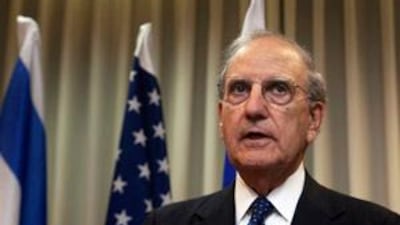US Middle East envoy George Mitchell held talks in Israel today after having a "candid and positive" discussion with Syrian president Bashar al-Assad amid a diplomatic push by Washington to jump-start stalled peace talks. Washington is committed to a "comprehensive peace in the Middle East and that includes Israel and Palestine, Israel and Syria, Israel and Lebanon and normal relations with all countries in the regions," defence minister Ehud Barak's office quoted Mr Mitchell as saying after the two held talks in Tel Aviv.
Earlier in Damascus the former US senator said he "just completed a very candid and positive conversation with President Assad." "I discussed with President Assad the prospects for moving forward on our goals of comprehensive peace in the region and improved bilateral ties between Syria and the United States," he said. Tomorrow Mr Mitchell is due to meet Palestinian president Mahmud Abbas in Ramallah and on Tuesday he is to hold talks with Israeli prime minister Benjamin Netanyahu, with discussions to focus on US demands that Israel halt settlement activity in the occupied West Bank.
Mr Netanyahu has so far refused to heed the calls and the disagreement has led to a level in tensions not seen in years between the two close allies. Mr Mitchell's latest trip to the region comes as part of a diplomatic push that will also see defence secretary Robert Gates arrive for a one-day visit in Israel tomorrow and national security adviser James Jones make a three-day trip beginning on Tuesday.
US president Barack Obama is determined to reach a comprehensive peace between Israel and all its Arab neighbours in order to guarantee "stability, security and prosperity" in the region, Mr Mitchell said in Damascus. "If we are to succeed, we will need Arabs and Israelis alike to work with us to bring about comprehensive peace. "We will welcome the full co-operation of the government of the Syrian Arab Republic in this historic endeavour."
Mr Obama has moved to re-engage Damascus as part of a bid to breathe new life into the faltering Middle East peace process. Syria and Israel held four rounds of preliminary negotiations through Turkish mediators last year but Syria broke them off in December amid Israel's deadly offensive against the Gaza Strip. The new Israeli government of Mr Netanyahu has since rejected Syria's minimum condition for a peace treaty - the return of the strategic Golan Heights which Israel seized in the 1967 Middle East war and annexed in 1981 in a move never recognised by the international community.
Mr Assad reiterated the Syrian demand in his talks with Mr Mitchell, insisting on "the right of Arabs to recover their occupied land through a just and comprehensive peace based on international resolutions and the principle of land for peace," the official Syrian Arab News Agency said. The last round of direct peace talks between the two sides broke down in 2000 when Israel baulked at the demand for the return of the whole of Golan, right down to the shores of the Sea of Galilee, the Jewish state's main water source.
US-Syrian relations - which were strained under the administration of president George W Bush - have begun to improve since Mr Obama became president. Washington announced on June 24 its decision to send an ambassador back to Damascus to replace the envoy who was recalled in 2005 after the assassination in Beirut of former Lebanese prime minister Rafiq Hariri. The killing was widely blamed on Syria although Damascus has steadfastly denied any involvement.
The flurry of diplomatic activity comes amid mounting friction between Israel and Washington over Washington's demand for a halt to Jewish settlement activity in the occupied West Bank, including annexed Arab east Jerusalem. Mr Netanyahu said before the weekly cabinet meeting on Sunday that the US envoys' visits reflect the "strong and broad relationship between Israel and the United States." But he acknowledged are were also differences.
"Naturally even within this friendly relationship there isn't total agreement on everything and on several issues we are trying to reach that understanding in order for us to be able to promote our common interests of peace, security and stability," he said. * AFP

